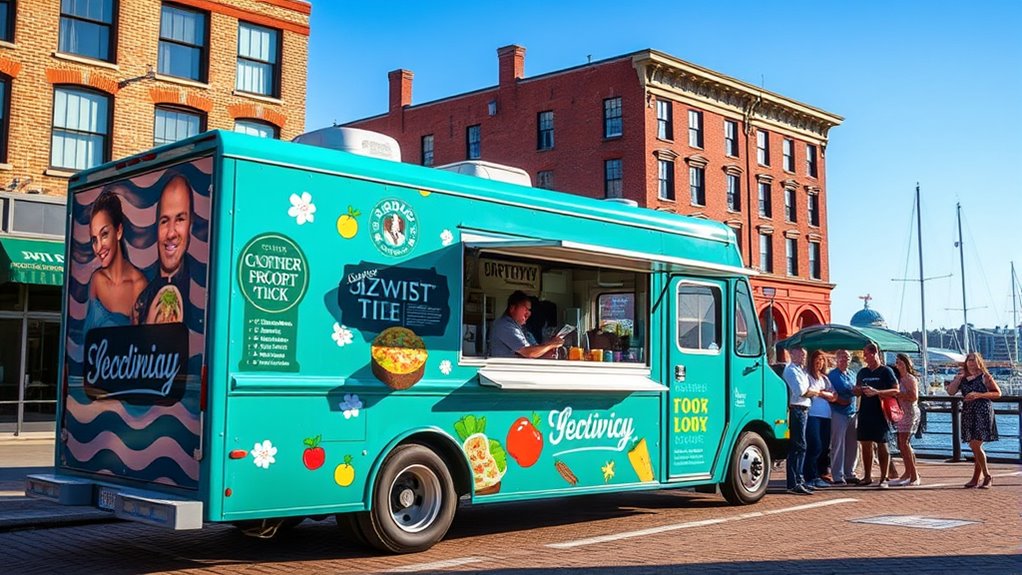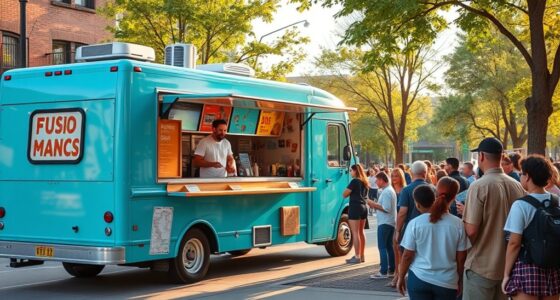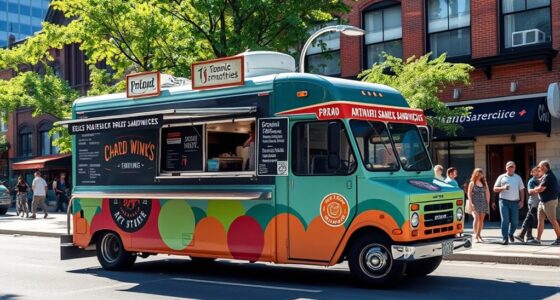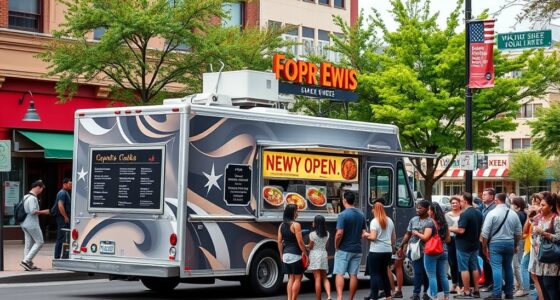To open a food truck in Warwick, Rhode Island, you need to secure permits like the Mobile Food Service License and Peddlers License, while budgeting for truck costs, equipment, and ongoing expenses. Focus on prime locations such as community events and busy streets, and craft a menu featuring local flavors to attract customers. Use social media marketing to grow your brand successfully. Keep exploring for detailed steps to guarantee your food truck thrives in Warwick.
Key Takeaways
- Obtain MFE registration, Rhode Island Department of Health license, and Warwick-specific peddlers license before operating.
- Budget $35,000–$200,000 for truck purchase, equipment, permits, and ongoing expenses.
- Target high-traffic areas, community events, and partner with local venues like Crowne Plaza for visibility.
- Craft a menu featuring regional flavors, fresh seafood, and local ingredients to appeal to Warwick customers.
- Use social media platforms like Facebook and participate in local events to effectively market and grow your brand.
Navigating Permit and Licensing Requirements
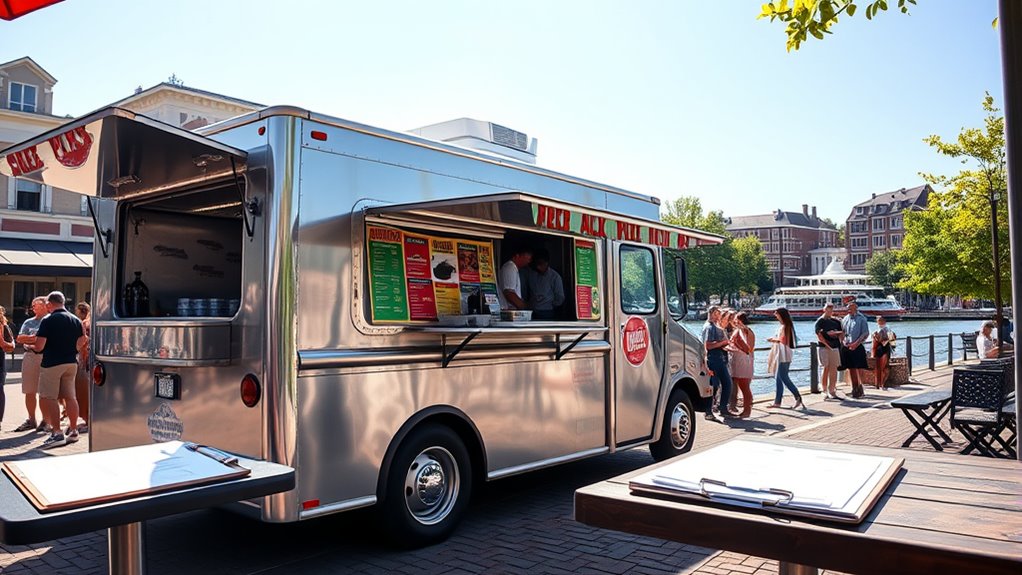
Managing permit and licensing requirements is a crucial step to launching your food truck in Warwick, Rhode Island. You’ll need to start with the Mobile Food Establishment (MFE) registration, which is mandatory before applying for local permits. Next, obtain a Mobile Food Service License from the Rhode Island Department of Health to serve food from your truck. You must also secure a Retail Sales Permit to collect sales tax, issued by the Rhode Island Division of Taxation. Your vehicle must be properly registered, and if you form a business, a Business License from the Secretary of State is required. In Warwick, you’ll need a Peddlers License to operate within city limits. Be prepared for inspections, especially fire safety checks, and ensure compliance with local and state regulations before opening. Registering your mobile food establishment is necessary to legally operate your food truck in Warwick, Rhode Island, and should be completed early in the planning process to avoid delays. Additionally, understanding compliance with health and safety standards is essential to maintain your license and ensure customer safety.
Understanding Costs and Budgeting for Your Food Truck Business
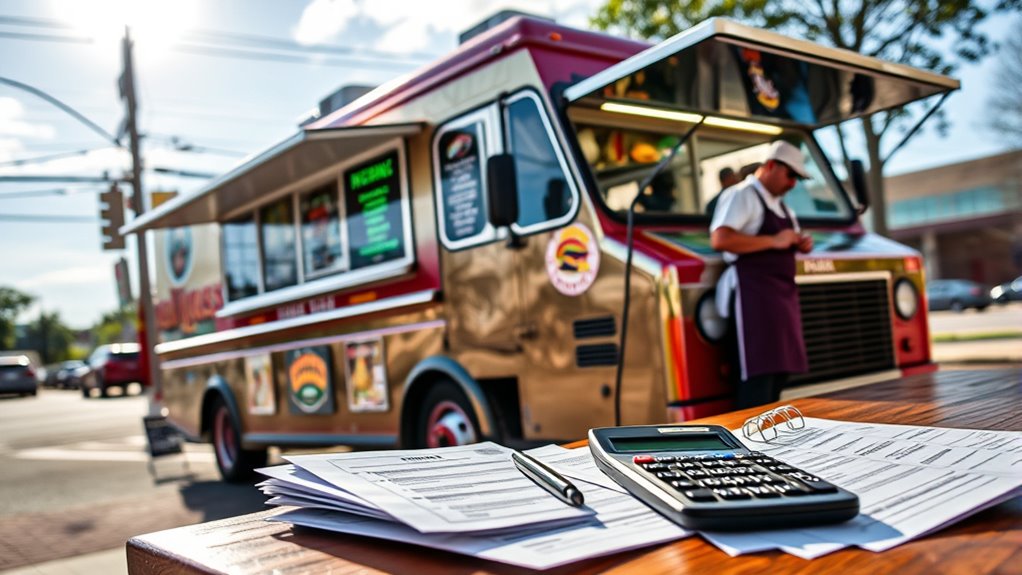
Understanding the costs involved in launching and operating your food truck is key to building a solid business plan. Initial investment includes purchasing a truck, which can range from $35,000 to $200,000 depending on new or used status. You’ll also need to budget for essential equipment like grills, fryers, refrigerators, and safety systems, which can total several thousand dollars. Ongoing expenses include food costs (25–35% of revenue), fuel, payroll, insurance, and permits, all of which require careful planning. Securing necessary licenses and permits can take several months, adding to initial startup timelines and costs. To stay on track, consider these aspects:
Launching a food truck requires significant investment in vehicle, equipment, and ongoing operational costs.
- Equipment and technology costs, such as POS systems and inventory software
- Monthly expenses like fuel, wages, and permits
- Initial branding and marketing investments, including truck wraps and advertising
- Buffer funds for market fluctuations and unexpected costs
A comprehensive cost analysis can help you identify potential financial challenges early. Effective budgeting ensures your food truck’s sustainability and growth.
Best Locations to Operate Your Food Truck in Warwick
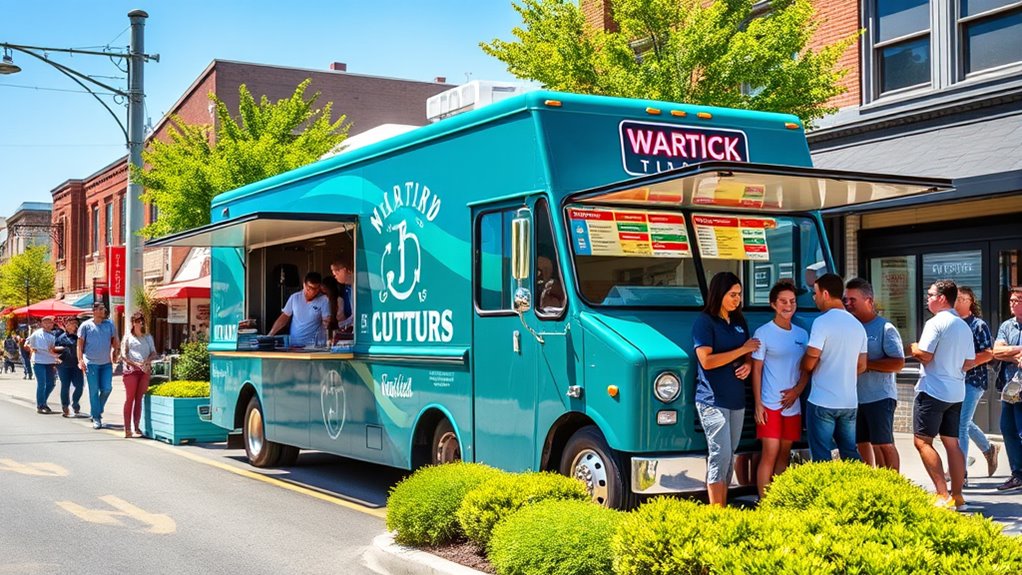
Choosing the right location is essential for your food truck’s success in Warwick. Popular event venues like Crowne Plaza Providence Warwick host “Warwick Food Truck Night,” drawing families and foodies with live music, local drinks, and a relaxed lawn setting. These events run August through October, offering steady foot traffic and promotional opportunities, especially with partnerships like FoodTrucksIn.com. Local community events, such as Movies In The Park, also attract crowds during outdoor movie nights, providing consistent customer streams. High-traffic commercial zones like Oakland Beach and busy shopping centers offer daily opportunities, especially during warmer months. Additionally, partnering with established brands like Iggy’s Food Truck can boost visibility. These locations maximize exposure, increase sales, and establish your presence in Warwick’s vibrant food scene. Event nights like Warwick Food Truck Night are particularly effective for gaining exposure and attracting new customers. Maintaining good storage conditions for your ingredients and supplies ensures food safety and quality, which is crucial for customer satisfaction and health compliance.
Crafting a Menu That Appeals to Local Tastes
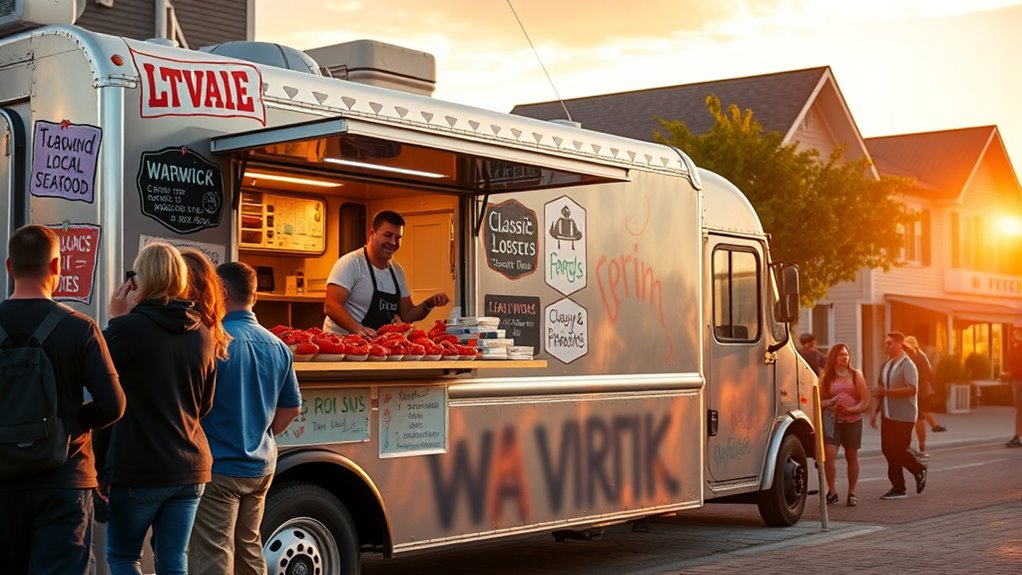
To create a menu that truly resonates with Warwick’s local tastes, focus on highlighting regional flavors and sourcing ingredients from nearby farms and fisheries. Incorporate fresh seafood, like lobster and clams, and craft dishes that reflect New England’s coastal heritage. Emphasize sustainability and support local food initiatives to appeal to eco-conscious customers. Consider including comfort foods with a regional twist, such as lobster grilled cheese or craft burgers, which are popular in Warwick’s dining scene. Additionally, understanding local zoning laws can help ensure your food truck operates smoothly within Warwick’s regulations.
Effective Marketing Strategies to Grow Your Food Truck Brand
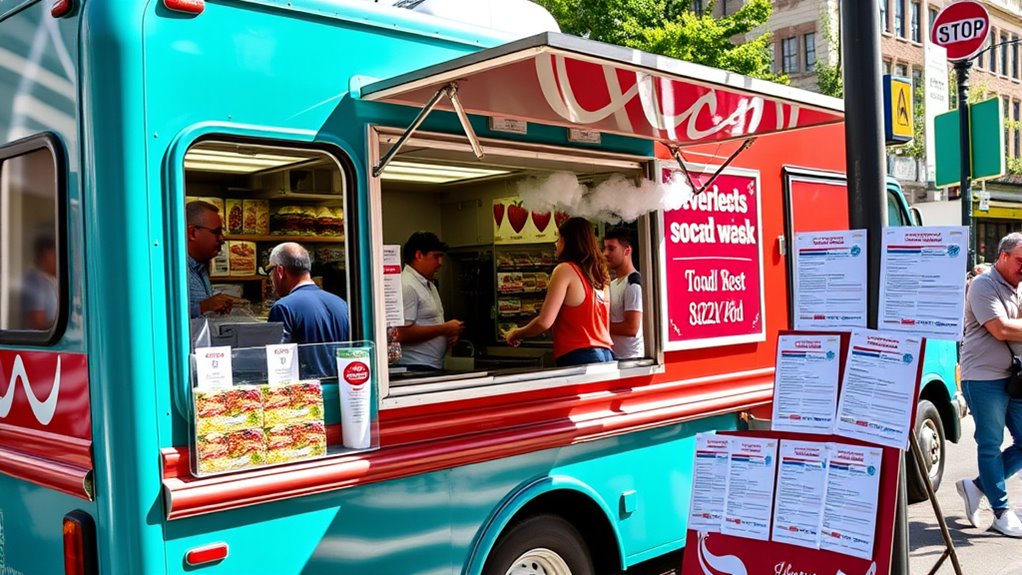
Leveraging social media platforms is one of the most effective ways to grow your food truck brand today. About 68% of owners regularly promote their business online, with Facebook being the top platform—used by 75% of trucks—to boost visibility and customer engagement. Social media campaigns can increase sales by 20% and raise customer spending by around 15%. To maximize impact, focus on targeted content and consistent interaction. Additionally, understanding your personality traits can help tailor your marketing style to better connect with your audience. Participating in local festivals and building loyalty programs further enhances your reach, helping to solidify your brand in Warwick’s vibrant food scene.
Tips for Ensuring Compliance and Successful Operations
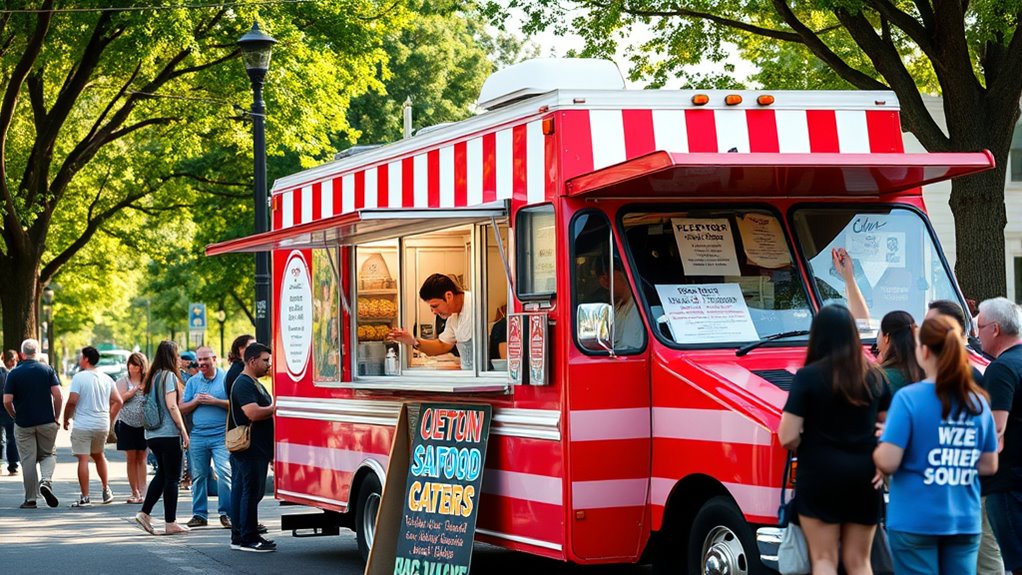
Ensuring compliance and smooth operations requires diligent attention to regulations and proactive management. You must stay on top of permits, inspections, and safety standards to avoid costly violations or shutdowns. Regularly verify that your mobile food establishment registration, health licenses, and municipal permits are up to date. Keep detailed records of inspections, tests, and maintenance logs for proof of compliance. Staying current with local regulations is crucial for legal operation. To stay compliant, focus on these key practices:
- Conduct routine vehicle safety and maintenance checks, documenting everything.
- Follow strict food safety, hygiene, and sanitation protocols per RIDOH standards.
- Maintain gas safety by testing LP connections and alarms before each use.
- Coordinate with local authorities for permits, event permissions, and zoning compliance.
- Staying informed about regulatory updates helps prevent unintentional violations and ensures your business remains compliant as laws evolve.
Being proactive helps you operate smoothly and build a reputable, compliant food truck business.
Frequently Asked Questions
How Long Does It Typically Take to Get All Necessary Permits?
Getting all your permits usually takes a few weeks. You’ll start by applying for your state MFE registration online, which generally processes quickly if you submit complete docs. Then, you’ll schedule municipal inspections and permits, which can take days to weeks depending on appointment availability and inspection results. Staying organized and prompt with your paperwork and appointments helps speed up the process, so plan ahead to avoid delays.
Are There Any Local Restrictions on Operating Hours for Food Trucks?
You need to check for local restrictions on food truck hours before you start. Warwick ordinances limit sales of certain foods near schools during school hours, like 8 a.m. to 3 p.m., to avoid disruptions. While there’s no city-wide published schedule, expect some restrictions, especially in community or school zones. Always verify with city officials to confirm your planned hours comply with local rules and avoid penalties.
What Insurance Requirements Are Mandatory for Food Truck Owners in Warwick?
You need to meet specific insurance requirements to operate your food truck in Warwick. This includes general liability insurance for injuries and property damage, commercial auto insurance since your truck is a vehicle, and food liability insurance for customer illnesses. Additionally, you must have trailer endorsement, inland marine, and fire code compliance for propane and electric systems. These guarantee your business stays protected and compliant with Rhode Island regulations.
Can I Operate My Food Truck at Multiple Events Simultaneously?
You can’t operate your food truck at multiple events simultaneously. The regulations require separate permits for each event, and your truck can only be physically present at one location at a time. Transporting food between sites takes time, and safety laws prevent splitting staff or equipment across multiple locations. To expand, consider multiple trucks or scheduling carefully to maximize your presence without violating permit or safety requirements.
Are There Specific Parking Regulations I Should Be Aware of in Warwick?
You need to follow Warwick’s parking rules carefully. Avoid parking on city streets unless you have explicit permission, and keep your truck at least 100 feet from nearby restaurants unless you get approval. Use designated off-street parking like driveways or approved lots, and don’t block traffic or public rights-of-way. Always guarantee your vehicle complies with local ordinances and inspections, so your operation stays legal and safe.
Conclusion
Launching your Warwick food truck is like planting a seed — with the right permits, a tasty menu, and clever marketing, your business will blossom. Stay adaptable, navigate regulations smoothly, and keep your customers hungry for more. As your wheels turn and aromas drift through the air, watch your dream grow into a vibrant, thriving corner of Warwick’s culinary landscape. With passion and persistence, you’ll turn your food truck journey into a flavorful adventure.
